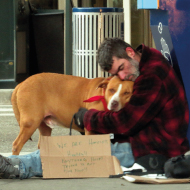
Guide to provide advice on providing for dogs and their owners in need
Dogs Trust and homelessness charity Simon Community Scotland are working together to raise awareness of the value of pets for people experiencing homelessness.
According to the BBC, Simon Community Scotland's new document, titled ‘Paws for Thought’ provides advice and guidance to housing and support service providers on how to integrate pets of homeless people in to what they do. Such as how to provide dog-friendly communal rooms in temporary shelters and create risk assessments to manage issues, like allergies, that may arise from staff members being around pets.
There is compelling evidence on the positive effect having a pet can have on your mental and physical health. The companionship, responsibility and purpose that a pet can bring to someone in a traumatic situation like homelessness can be life-altering.
The ‘Paws for Thought’ guide asks readers to genuinely stop and think about the journey that people on the street may have been through and the benefits that owning a pet can have.
Simon Community Scotland are also equipping their Edinburgh and Glasgow street teams with ‘street packs for dogs’, which contain bowls, food, leads, jackets, toys and more to help homeless dog owners to provide for their pets, as they will often sacrifice their own needs to supply essentials like these.
Lorraine McGrath, CEO of Simon Community Scotland commented: “No one should ever be placed in a position where they have to choose between a safe place to stay or their pet. What makes this choice even harder is the trauma and loss many of the people we support have experienced.
“Being asked to give up the only constant in their lives that gives them company, purpose, security and love simply adds more trauma and loss to an already awful journey. The great thing is it doesn’t have to be like that, being dog/pet friendly isn’t that hard. This document shares the experiences and opportunities to provide that approach.”



 The Veterinary Medicines Directorate (VMD) is inviting applications from veterinary students to attend a one-week extramural studies (EMS) placement in July 2026.
The Veterinary Medicines Directorate (VMD) is inviting applications from veterinary students to attend a one-week extramural studies (EMS) placement in July 2026.